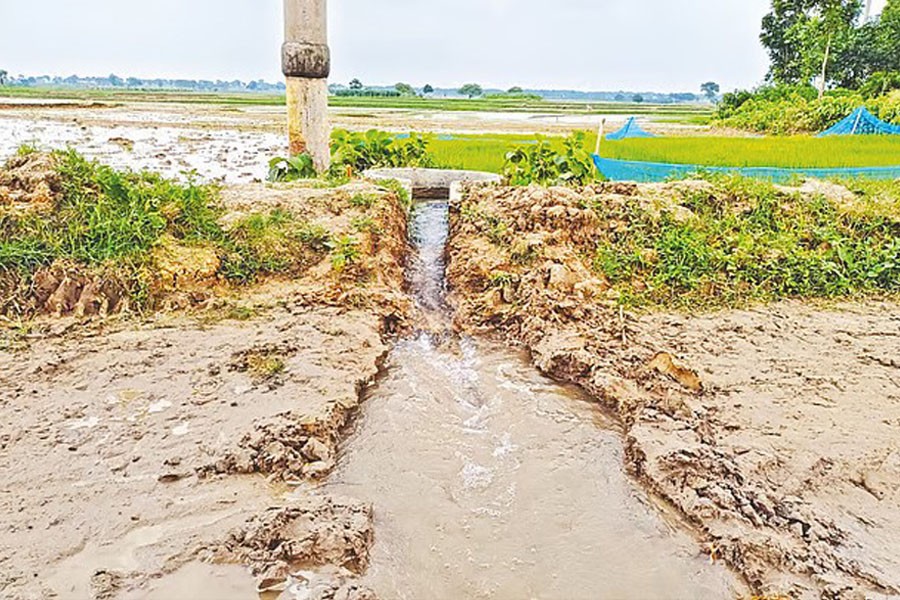
Published :
Updated :

RAJSHAHI, Nov 12: Bangladesh's northern districts-particularly Rajshahi, Naogaon, and Chapainawabganj-are facing an escalating water crisis that now threatens the country's overall food security.
Declining rainfall, rising temperatures, and falling groundwater levels are putting the nation's key grain-producing region under severe stress.
According to Prof Chowdhury Sarwar Jahan of Rajshahi University's Department of Geology and Mining, discussions on climate change often focus on coastal regions, while the country's "grain basket" in the north faces an equally alarming situation. "If agriculture in this region fails, national food security will be at stake," he warned.
In Tilna union under Sapahar upazila of Naogaon, farmers say groundwater that was once available at 30 feet now lies at a level lower than 50 feet. "At 30 feet you now find dry red sand-no water, dead soil," said farmer Rafiqul Islam.
Local officials confirmed the crisis. Sapahar Upazila Agriculture Officer Shapla Khatun said many of the area's 360 deep tube-wells become inoperative every year, driving up irrigation costs.
Research by the Bangladesh Water Development Board (BWDB) shows groundwater levels have dropped by one to three metres in two-thirds of the country over the past four decades.
In Godagari upazila of Rajshahi, the monsoon recharge level that once reached 16-18 metres in the 1980s now barely touches 16 metres.
In Chapainawabganj's Nachole upazila, Agriculture Officer Saleh Akram reported a 35 per cent decline in Boro paddy output this season, attributing it to inadequate irrigation caused by falling groundwater.
June rainfall was 20 per cent below normal this year, continuing a decades-long decline in precipitation across the northwest. Between 1948 and 2015, annual rainfall in the region decreased by an average of 0.5 millimetres per year, reducing aquifer recharge and drying up local wetlands such as the once-bountiful Jobai Beel in Sapahar.
Rising heat compounds the problem. March-April temperatures frequently exceed 35°C, disrupting rice pollination and increasing the prevalence of "chita" (sterile grains). "Farmers now face over 80 types of pest attacks due to increased heat," said AKM Monzure Maula, deputy director of the Department of Agricultural Extension in Chapainawabganj.
About 60 per cent of Bangladesh's rice comes from the Boro season-most of which is grown in the northern region. A combination of water scarcity and heat stress now poses a major threat to national grain supply.
A 2025 study in the Global Food Security Journal warns that without effective water management, northern Bangladesh's food security could decline by over 50 per cent. Another study by the University of Glasgow projects similar losses if regional temperatures rise by 3.5-5.7°C and river flows continue to decline.
The water crisis has already altered rural livelihoods. "As irrigation becomes harder, farmers are switching from rice to mango," said Mithun Majid, senior manager at BRAC. "This shift reduces farm labour demand, leaving many landless workers unemployed."
Some, like Abdur Rahim, a fisherman from Chapainawabganj, have turned to construction work in Rajshahi after rivers dried up for most of the year. Others, such as Simli Kundu from Tanore, report widespread rural migration to cities in search of jobs.
Prof Jahan noted that human activities are amplifying natural stresses-"Unplanned urbanisation, pond and canal encroachment, and tree felling are obstructing groundwater recharge."
The Barind Multipurpose Development Authority (BMDA) says it is drawing water from the Mahananda River through a double-lifting system to reduce pressure on aquifers. But when asked about unregulated deep tube-well use, BMDA Executive Director Tariqul Alam said, "No such data is available with me."
Local civil society leaders are calling for urgent regulatory measures. Sufi Uddin Ahmed, Rajshahi district president of Sujan, said: "Uncontrolled development and thousands of deep tube-wells are depleting the aquifers. The government must enforce strict laws to conserve rivers and wetlands."
When contacted, Rajshahi Divisional Commissioner KhondkerAzim Ahmed declined to comment, saying, "I haven't yet received any official document or report on the issue."
anaetru@gmail.com


 For all latest news, follow The Financial Express Google News channel.
For all latest news, follow The Financial Express Google News channel.